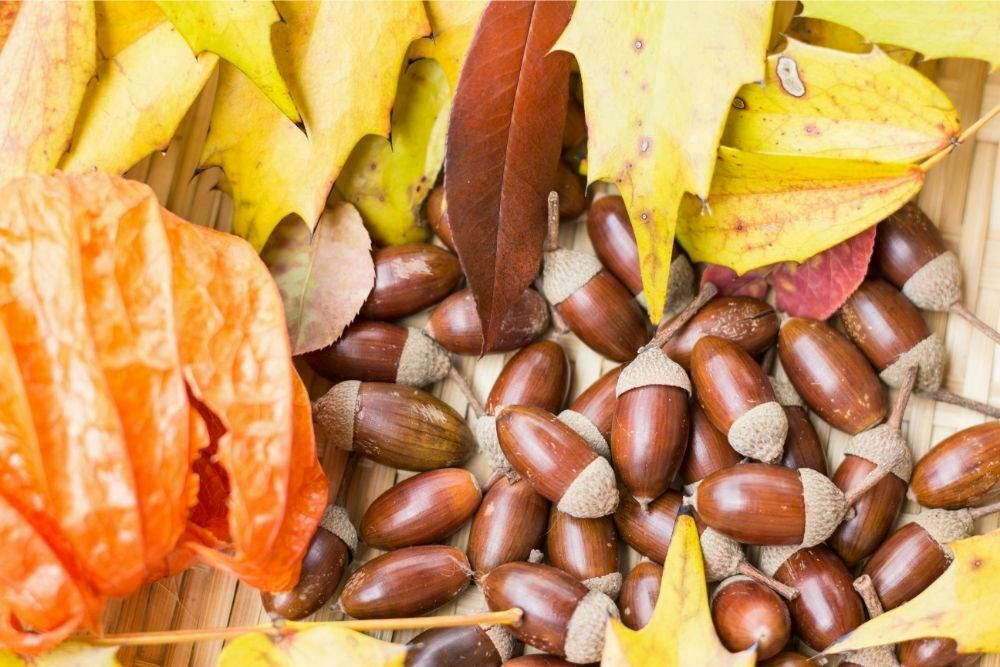Having a dog is one of the loveliest pleasures in the world. However, there is no denying that it can be a tad stressful at times. One of the leading causes of stress for dog owners is the fact that their beloved furry friends seem to want to eat everything.

Now, this would be fine if we could have the reassurance that dogs only ate things that were good for them, but it seems our little pals have no concept of what foods are good for them and what foods could make them violently unwell. Case in point, acorns.
For some reason, dogs seem to be wildly attracted to acorns. It is as though they think they are giant squirrels. However, acorns are actually very bad for dogs; from presenting a choking hazard to being poisonous, they are totally and utterly a no-no. Does that stop dogs from trying to eat them? Of course not.
In this article, we are going to be exploring the toxicity of acorns for dogs in more detail, as well as examining just how poisonous they are, what the symptoms of acorn poisoning might be, and how they can be treated. We will also be delving into some other frequently asked questions regarding acorns and dogs.
Are acorns poisonous to dogs?
Yes, acorns can be poisonous to dogs, and the amount of toxicity will depend on several factors, such as how big your dog is and how many acorns they consume. Smaller dogs would only need a small number of acorns to make them ill. A bigger dog would need to consume more acorns to become ill. That said, you should not let your dog eat any number of acorns.
The compound that makes acorns poisonous to dogs is known as tannic acid, or simply tannins. Whilst tannins may be perfectly safe for animals such as squirrels who consume acorns regularly, the reason they don’t affect them is that they produce a secretion called mucin that counteracts any negative side effects from the tannins.
However, dogs cannot secrete this mucin so tannic acid can be very harmful. At best, it can cause vomiting and diarrhea; at worst, it can cause complete kidney failure and death. Whilst the latter occurrence is very rare, it is still not worth the risk, especially since even the lesser symptoms are very unpleasant and painful for your pooch pal!
We will explore these symptoms and signs of poisoning from acorns in more detail in the next section, but suffice to say for now that you should be raking your garden regularly in the fall, especially if you happen to have an oak tree nearby, to ensure your beloved furry friend doesn’t snarfle a potential poison.
The same goes when you are out walking in the park or woodland – keep them away from acorns and immediately take any they have in their mouths from them.
What happens if a dog eats an acorn?
If a dog eats an acorn, many different things can happen. You need to be on the lookout for signs of symptoms of toxicity and poisoning immediately. Sometimes these effects may happen very quickly; other times, they may take a few hours to take hold and even up to a week!
This means you need to monitor your dog closely, which is also why it is wise to take them to the vet immediately if you know they have eaten even one acorn!
The first signs and symptoms to keep an eye out for are vomiting and sickness. Your dog may seem unwell and lethargic. They may not want to eat their meals as usual because they will feel too sick.
You may also notice diarrhea which may or may not have blood in it. They may be in pain and so may cry or yelp; this is because acorn poisoning can cause stomach pain and inflammation. More serious signs that happen after a few days include dehydration, collapse, toxic shock, and even death.
Alternatively, your dog may eat one acorn and seem completely fine. In our opinion, we would recommend getting your dog checked out anyway, even if they just eat one acorn (or even just a bite of one).
The reason for this is that some symptoms may not show for a few days. It is always best to err on the side of caution, and you will never regret getting your beloved furry friend checked out, even if it is a false alarm!
There is also a name given to acorn poisoning in dogs. The same name is given to any kind of poison or toxicity from an oak tree. This is known as Quercus and could be very dangerous, if not lethal!
You also need to be aware of the choking risk acorns present to dogs. Dogs will not be able to chew them well due to how solid they are. Their shape makes them easy to roll down your dog’s throat, posing a major choking risk. This alone is enough to keep them away from acorns.

How to treat a dog when they eat an acorn?
To treat a dog that has eaten an acorn, you should first take your dog to a vet. If it is an emergency and your vet is closed, you can take them to your area’s closest out-of-hours vet or an emergency vet. Do not try and treat your dog at home, as it is not likely that you will have the right medicine.
When your dog gets to the vet, there are a number of treatment options. The dog may be given an injection that will make them throw up. This will make them bring up the acorns that they consumed.
The dog will also likely receive some rehydrating treatment, especially if they have been experiencing vomiting and diarrhea, which can worsen dehydration anyway. Another option will be to administer charcoal to your dog, which will neutralize and absorb the harmful compounds in the acorn.
If your vet suspects there may be kidney and liver damage, they will do blood tests on your dog to ensure everything is working as it should be. They may also perform an x-ray on your dog if there is a suspected blockage. If a blockage or tear is found, surgery may be required to fix the issue.
Try not to worry too much if your dog needs surgery or indeed, any treatment from the vet. The likelihood of your dog suffering a fatal consequence from eating acorns is very low, especially if they only ate a small number of acorns.
As worrying as it is, you should stay calm for your dog. They will be in good hands with an experienced vet who knows exactly how to treat acorn toxicity. Remember, always err on the side of caution and get your dog treated after they consume acorns, even if they seem fine!
Are acorn caps poisonous to dogs?
Acorn caps could also be poisonous to dogs. We get it; you may think that the main body of the acorn will be the most poisonous part. However, there has not been much in the way of research done on the effect of acorn caps on dogs.
With this in mind, it is best to err on the side of caution and assume that the cap of an acorn will be poisonous too. There is some method behind this assumption too. It is thought that the larger the cap on an acorn, the more tannin compounds there are inside.
Of course, knowing what we do about tannic acid and its effect on dogs, it seems that acorns with bigger caps will be more poisonous to dogs. With this in mind, your dog should avoid all parts of the acorn.
In fact, it should also be noted that there are different types of an acorn. You may well wonder whether all types of acorns are poisonous to dogs. We want to clarify that your dog should not consume any acorns. They should be avoided at all costs as they are not worth the risk of your dog getting sick.
This also goes for the different stages of an acorn. Whether they are young acorns (these are usually green) or old and dried out, they all still pose a risk of toxicity.
Are oak leaves poisonous to dogs?
Yes! It is possible that oak leaves can cause poisoning and toxicity symptoms in your dog in the same way as acorns do. The reason for this is because of the tannic acid (also known as tannins) present in an oak tree.
Do not let your dog eat oak leaves, whether fresh or dry. As such, it is important that you rake your lawn well in the fall, doing it daily if needed, especially if you have an oak tree directly in your yard.
Oak leaves can also cause Quercus; as such, you can expect your dog to experience the same symptoms as they would if they eat acorns, especially if they manage to consume a lot of oak leaves. Symptoms to look out for include vomiting, sickness, diarrhea, blood in poop, general lethargy, crying and yelping, seeming unwell, and collapse. In extreme cases, death may even occur.
With this in mind, it is of utmost importance that you take your dog to the vet if you notice that they have eaten any oak leaves. Even if they seem fine at the moment, they should still be assessed by the vet. The reason for this is that it can take a number of days for symptoms to take hold, and by then, it may even be too late.
Can an acorn kill my dog?
It is very rare for an acorn to kill your dog. In order for your dog to ingest enough tannic acid to kill them, they would need to consume a large number of acorns. As such, just one should not be lethal. That being said, it can be hard to know for sure, and it is just not worth the risk.
Even if they do not kill your dog directly, they can cause some nasty symptoms such as blockages, diarrhea, sickness, and dehydration, leading to death if they are serious or left untreated.
If your dog does happen to eat an acorn, try not to panic, as it is unlikely that it will die, especially right away. Get them to the vet as soon as possible, and they should recover fully!
